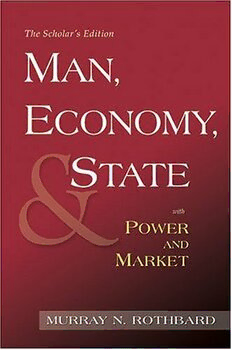
Man, Economy, and State with Power and Market (Scholars Edition) PDF
1543 Pages·2004·4.476 MB·English
Most books are stored in the elastic cloud where traffic is expensive. For this reason, we have a limit on daily download.
Preview Man, Economy, and State with Power and Market (Scholars Edition)
Description:
Murray N. Rothbard's great treatise Man, Economy, and State and its complementary text Power and Market provides a sweeping presentation of Austrian economic theory, a reconstruction of many aspects of that theory, a rigorous criticism of alternative schools, and an inspiring look at a science of liberty that concerns nearly everything and should concern everyone. The Mises Institute's new edition of Man Economy, and State, united for the first time with its formerly sundered companion volume Power and Market, is a landmark in the history of the Institute. It takes this book out of the category of underground classic and raises it up to its proper status as one of the great economic treatises of all time, a book that is essential for anyone seeking a robust economic education. The revealing new introduction by Joseph Stromberg uses material from the Rothbard Archives, including his personal notes during the research and writing phases, to reconstruct the intellectual setting in which the book was written, and its initial and widening impact. For years, the Mises Institute has kept it in print and sold thousands of copies in a nice paperback version. Now in our twentieth year, we decided to take a big step and put out an edition worthy of this great treatise. It is the Scholar's Edition of Man, Economy, and State—-an edition that will immediately become definitive and used throughout the world. The footnotes (which are so brilliant and informative!) are at the bottom of every page. The index is huge and comprehensive. The binding is impeccable and its beauty unmatched. Students have used this book for decades as the intellectual foil for what they have been required to learning from conventional economics classes. In many ways, it has built the Austrian school in the generation that followed Mises. It was Rothbard who polished the Austrian contribution to theory and wove it together with a full-scale philosophy of political ethics that inspired the generation of the Austrian revival, and continues to fuel its growth and development today. From Rothbard, we learn that economics is the science that deals with the rise and fall of civilization, the advancement and retrenchment of human development, the feeding and healing of the multitudes, and the question of whether human affairs are dominated by cooperation or violence. Economics in Rothbard's wonderful book emerges as the beautiful logic of that underlies human action in a world of scarcity, the lens on how exchange makes it possible for people to cooperate toward their mutual betterment. We see how money facilitates this, and allows for calculation over time that permits capital to expand and investment to take place. We see how entrepreneurship, based on real judgments and risk taking, is the driving force of the market. What's striking is how this remarkable book has lived in the shadows for so long. It began as a guide to Human Action, and it swelled into a treatise in its own right. Rothbard worked many years on the book, even as he was completing his PhD at Columbia University. He realized better than anyone else that Mises's economic theories were so important that they needed restatement and interpretation. But he also knew that Misesian theory needed elaboration, expansion, and application in a variety of areas. The result was much more: a rigorous but accessible defense of the whole theory of the market economy, from its very foundations. But the publisher decided to cut the last part of the book, a part that appeared years later as Power and Market. This is the section that applies the theory presented in the first 1,000 pages to matters of government intervention. Issue by issue, the book refutes the case for taxation, the welfare state, regulation, economic planning, and all forms of socialism, large and small. It remains an incredibly fruitful assembly of vigorous argumentation an
See more
The list of books you might like
Most books are stored in the elastic cloud where traffic is expensive. For this reason, we have a limit on daily download.
